
BY NIMMI RAGHUNATHAN
LOS ANGELES, CA – The Navin and Pratima Doshi Bridgebuilder Award at the Loyola Marymount University was conferred on the Democratic Congresswoman from Hawaii, Tulsi Gabbard on Oct. 1 at an event on the college campus. The award is given annually to honor an individual dedicated to fostering...
LOS ANGELES, CA – The Navin and Pratima Doshi Bridgebuilder Award at the Loyola Marymount University was conferred on the Democratic Congresswoman from Hawaii, Tulsi Gabbard on Oct. 1 at an event on the college campus. The award is given annually to honor an individual dedicated to fostering...
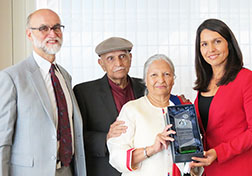
understanding between cultures, peoples and disciplines. Gabbard becomes the first American politician on a list of luminaries who have received the award like the monk Thich Nhat Hanh and author Houston Smith, who have crossed barriers and polarization in space and time to be voices of reason, love and oneness. Even to those jaded by politicians - and in a particularly ferocious presidential election season – the youthful Gabbard did not disappoint and came off as keenly interested in citizen welfare, strong and independent.
Quickly off the mark, at the top of the event, was the one thing that sets her clearly apart in Congress – her Hindu faith and the impact it has had in the public space. So there was Pratima Doshi explaining to the audience what the Tulsi has meant to the Hindu psyche and Navin Doshi eagerly speaking of pluralism.
There are and have been Indian-Americans who have been elected to office but the chances of them speaking openly about Kirtan, Bhakti, the Bhagavad Gita and Karma Yoga, let alone acknowledging the faith they were born into, have been close to nil. Gabbard chooses not to be fettered.
She began by telling her listeners on how her father went to a seminary but, “did not make it……lucky for me!” She chose to follow her mother and Siddhaswarupananda Paramahamsa who is affiliated to the ISKCON movement but, Gabbard pointed out, she was not limited by it and remembers growing up participating in kirtans and attending Sunday mass. The focus in the home was, “on the true teachings of the scriptures,” she said.
The 35-year-old’s cornerstone is public service and she freely told her audience that she drew that idea and strength to do it by imbibing the spirit of Aloha, the Gita, Mahatma Gandhi, and their espousal of spiritual love. This, she said, had helped her be an effective ‘bridgebuilder’ in a divisive world and in the corridors of gridlocked politics.
‘Aloha,’ her state’s distinctive greeting Gabbard said, meant this: ‘I come to you with respect, no matter who you are. We share the same air that we breathe.’ This is further buttressed by the concept of what she terms as “servant leadership,” where the leader or public official is there to serve for the greater good, without worrying about oneself. This is a central tenet of karma yoga and, Gabbard declared, she is a practitioner. This understanding, the congresswoman said, she takes with her to Washington and finds she can cross the aisle and vote free of ideology, focused only on what is needed for all.
She narrated an action she took on first getting to Congress in 2012 when she had her mother in Hawaii make 435 boxes of macadamia candy, an additional 435 boxes for congressional staff and then sat down in Washington to write notes to each representative. The effect was immediate, with Republicans reaching out to thank her and then engage her with talk about what her state and constituency might need. “We might disagree on 95% but there is a 5% possibility to get things done,” the Doshi Bridgebuilder award winner asserted quoting Gandhiji, ‘A small body of determined spirits fired by an unquenchable faith in their mission can alter the course of history.’
It’s not to say that Gabbard is not aware that her Hindu faith makes her different. But firmness, strength and an open heart she believes have held up well for her. A bit wary on how she would be perceived when she decided to get sworn into Congress on the Gita, she said she found heartwarming support immediately after. Gabbard who recently wed Abraham Williams in a Vedic ceremony in Hawaii, said she invited friends from congress who included conservative Christians and they participated whole heartedly in the kirtan, “singing Krishna and Gopala along with the others!”
Woman Vet
If Gabbard being the first Hindu congressional rep is seminal in the discourse of diversity, her being only one of two female combat veterans in Congress is important in gender politics. Gabbard’s two rounds of volunteer duty in the Middle East is reflected in her speech – no nonsense and clipped. That background combined with her faith, has brought a certain urgency to her public service. In answer to a question that followed her speech, she spoke of a sign board which she would see while on combat duty which simply and starkly read, “Is today, the day?” Pointing out that the nature of the body is temporary, she said, “we don’t have a contract on time.”
Responses
The Doshi Bridgebuilder award event this year had an interesting response segment. LMU Professor of Political Science and Chicano Studies, Fernando Guerra made the point that Gabbard and Hawaii were leaders in inclusivity. California, he said, was diverse and home to several ethnicities but by far was a state that was still segmented and was, “too Latina and too Asian.” In contrast Gabbard, like most Hawaiians, was the true face of integration with multiple ethnic strains in their make-up. The professor pointed that this meant that she was not elected to office through a Hindu Vote or any other particular voting group.
Susan Abraham, Chair of Theological Studies at LMU was equally articulate. In response to the openness espoused by Gabbard, Abraham spoke of the task of grading students in class. She made the argument that we train minds to win and lose, setting up a paradigm of domination and subordination, instead of one of cooperation. Bringing her feminist ideology to the fore to make her case, she said she had always seen the woman getting up to serve everyone their meal as subordination, till it came to her one day that the woman serving the chicken at the dinner table was passing out the all important protein and was making sure that it was done equally to all. Suddenly, that was empowering and not just subservient.
The event concluded with a reception that reflected a bit of Hawaii but was wholly vegetarian.
Quickly off the mark, at the top of the event, was the one thing that sets her clearly apart in Congress – her Hindu faith and the impact it has had in the public space. So there was Pratima Doshi explaining to the audience what the Tulsi has meant to the Hindu psyche and Navin Doshi eagerly speaking of pluralism.
There are and have been Indian-Americans who have been elected to office but the chances of them speaking openly about Kirtan, Bhakti, the Bhagavad Gita and Karma Yoga, let alone acknowledging the faith they were born into, have been close to nil. Gabbard chooses not to be fettered.
She began by telling her listeners on how her father went to a seminary but, “did not make it……lucky for me!” She chose to follow her mother and Siddhaswarupananda Paramahamsa who is affiliated to the ISKCON movement but, Gabbard pointed out, she was not limited by it and remembers growing up participating in kirtans and attending Sunday mass. The focus in the home was, “on the true teachings of the scriptures,” she said.
The 35-year-old’s cornerstone is public service and she freely told her audience that she drew that idea and strength to do it by imbibing the spirit of Aloha, the Gita, Mahatma Gandhi, and their espousal of spiritual love. This, she said, had helped her be an effective ‘bridgebuilder’ in a divisive world and in the corridors of gridlocked politics.
‘Aloha,’ her state’s distinctive greeting Gabbard said, meant this: ‘I come to you with respect, no matter who you are. We share the same air that we breathe.’ This is further buttressed by the concept of what she terms as “servant leadership,” where the leader or public official is there to serve for the greater good, without worrying about oneself. This is a central tenet of karma yoga and, Gabbard declared, she is a practitioner. This understanding, the congresswoman said, she takes with her to Washington and finds she can cross the aisle and vote free of ideology, focused only on what is needed for all.
She narrated an action she took on first getting to Congress in 2012 when she had her mother in Hawaii make 435 boxes of macadamia candy, an additional 435 boxes for congressional staff and then sat down in Washington to write notes to each representative. The effect was immediate, with Republicans reaching out to thank her and then engage her with talk about what her state and constituency might need. “We might disagree on 95% but there is a 5% possibility to get things done,” the Doshi Bridgebuilder award winner asserted quoting Gandhiji, ‘A small body of determined spirits fired by an unquenchable faith in their mission can alter the course of history.’
It’s not to say that Gabbard is not aware that her Hindu faith makes her different. But firmness, strength and an open heart she believes have held up well for her. A bit wary on how she would be perceived when she decided to get sworn into Congress on the Gita, she said she found heartwarming support immediately after. Gabbard who recently wed Abraham Williams in a Vedic ceremony in Hawaii, said she invited friends from congress who included conservative Christians and they participated whole heartedly in the kirtan, “singing Krishna and Gopala along with the others!”
Woman Vet
If Gabbard being the first Hindu congressional rep is seminal in the discourse of diversity, her being only one of two female combat veterans in Congress is important in gender politics. Gabbard’s two rounds of volunteer duty in the Middle East is reflected in her speech – no nonsense and clipped. That background combined with her faith, has brought a certain urgency to her public service. In answer to a question that followed her speech, she spoke of a sign board which she would see while on combat duty which simply and starkly read, “Is today, the day?” Pointing out that the nature of the body is temporary, she said, “we don’t have a contract on time.”
Responses
The Doshi Bridgebuilder award event this year had an interesting response segment. LMU Professor of Political Science and Chicano Studies, Fernando Guerra made the point that Gabbard and Hawaii were leaders in inclusivity. California, he said, was diverse and home to several ethnicities but by far was a state that was still segmented and was, “too Latina and too Asian.” In contrast Gabbard, like most Hawaiians, was the true face of integration with multiple ethnic strains in their make-up. The professor pointed that this meant that she was not elected to office through a Hindu Vote or any other particular voting group.
Susan Abraham, Chair of Theological Studies at LMU was equally articulate. In response to the openness espoused by Gabbard, Abraham spoke of the task of grading students in class. She made the argument that we train minds to win and lose, setting up a paradigm of domination and subordination, instead of one of cooperation. Bringing her feminist ideology to the fore to make her case, she said she had always seen the woman getting up to serve everyone their meal as subordination, till it came to her one day that the woman serving the chicken at the dinner table was passing out the all important protein and was making sure that it was done equally to all. Suddenly, that was empowering and not just subservient.
The event concluded with a reception that reflected a bit of Hawaii but was wholly vegetarian.

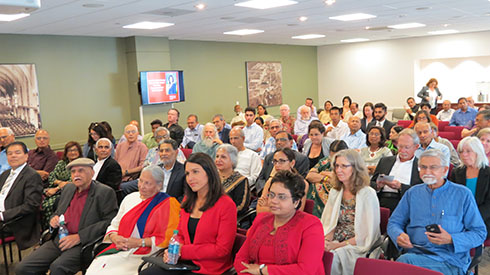
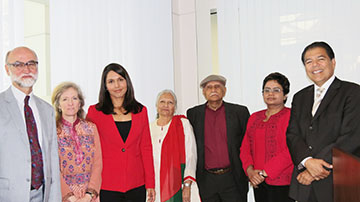
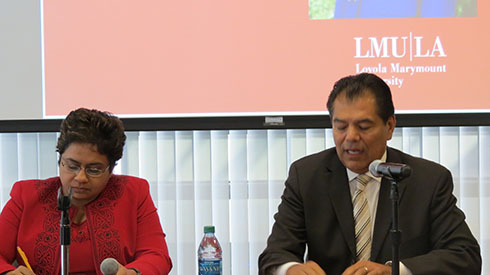
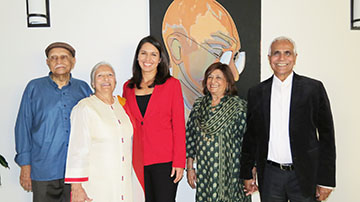
 RSS Feed
RSS Feed
